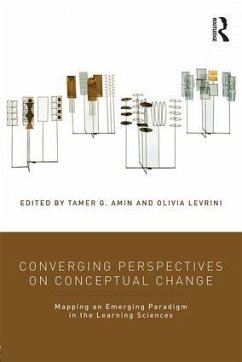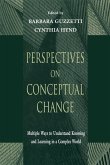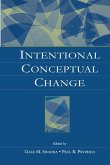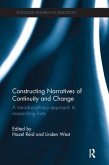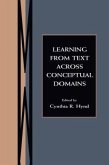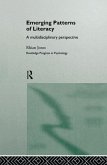Converging Perspectives on Conceptual Change
Mapping an Emerging Paradigm in the Learning Sciences
Herausgeber: Amin, Tamer G.; Levrini, Olivia
Converging Perspectives on Conceptual Change
Mapping an Emerging Paradigm in the Learning Sciences
Herausgeber: Amin, Tamer G.; Levrini, Olivia
- Broschiertes Buch
- Merkliste
- Auf die Merkliste
- Bewerten Bewerten
- Teilen
- Produkt teilen
- Produkterinnerung
- Produkterinnerung
Leading international scholars show how distinct interdisciplinary lines of research and inquiry complement each other and converge over time raising questions for the future of conceptual change research. Areas include process, modelling and argumentation, metacognition and epistemology, language and discourse, identity and social interaction.
Andere Kunden interessierten sich auch für
![Perspectives on Conceptual Change Perspectives on Conceptual Change]() Perspectives on Conceptual Change52,99 €
Perspectives on Conceptual Change52,99 €![Intentional Conceptual Change Intentional Conceptual Change]() Intentional Conceptual Change65,99 €
Intentional Conceptual Change65,99 €![Constructing Narratives of Continuity and Change Constructing Narratives of Continuity and Change]() Constructing Narratives of Continuity and Change65,99 €
Constructing Narratives of Continuity and Change65,99 €![Learning From Text Across Conceptual Domains Learning From Text Across Conceptual Domains]() Learning From Text Across Conceptual Domains63,99 €
Learning From Text Across Conceptual Domains63,99 €![Thinking about the Teaching of Thinking Thinking about the Teaching of Thinking]() Dorothy R. HowieThinking about the Teaching of Thinking51,99 €
Dorothy R. HowieThinking about the Teaching of Thinking51,99 €![Psychology and Ethical Development (REV) RPD Psychology and Ethical Development (REV) RPD]() R. S. PetersPsychology and Ethical Development (REV) RPD59,99 €
R. S. PetersPsychology and Ethical Development (REV) RPD59,99 €![Emerging Patterns of Literacy Emerging Patterns of Literacy]() Rhian JonesEmerging Patterns of Literacy65,99 €
Rhian JonesEmerging Patterns of Literacy65,99 €-
-
-
Leading international scholars show how distinct interdisciplinary lines of research and inquiry complement each other and converge over time raising questions for the future of conceptual change research. Areas include process, modelling and argumentation, metacognition and epistemology, language and discourse, identity and social interaction.
Produktdetails
- Produktdetails
- Verlag: Routledge
- Seitenzahl: 392
- Erscheinungstermin: 13. November 2017
- Englisch
- Abmessung: 234mm x 156mm x 21mm
- Gewicht: 594g
- ISBN-13: 9781138205406
- ISBN-10: 1138205400
- Artikelnr.: 49155292
- Herstellerkennzeichnung
- Libri GmbH
- Europaallee 1
- 36244 Bad Hersfeld
- gpsr@libri.de
- Verlag: Routledge
- Seitenzahl: 392
- Erscheinungstermin: 13. November 2017
- Englisch
- Abmessung: 234mm x 156mm x 21mm
- Gewicht: 594g
- ISBN-13: 9781138205406
- ISBN-10: 1138205400
- Artikelnr.: 49155292
- Herstellerkennzeichnung
- Libri GmbH
- Europaallee 1
- 36244 Bad Hersfeld
- gpsr@libri.de
Tamer G. Amin is Associate Professor in the Department of Education, and Director of the Science and Mathematics Education Center at the American University of Beirut, Lebanon. Olivia Levrini is Associate Professor in Physics Education and History of Physics at the University of Bologna, Italy.
Acknowledgements
List of Contributors
Introduction T. G. Amin, O. Levrini
Part I: The Nature of Concepts and Conceptual Change B. Sherin Chapter 1:
Knowledge in Pieces: An Evolving Framework for Understanding Knowing and
Learning A. A. diSessa Chapter 2: Initial and Scientific Understandings and
the Problem of Conceptual Change S. Vosniadou Chapter 3: Addressing Robust
Misconceptions through the Ontological Distinction between Sequential and
Emergent Processes J. B. Henderson, E. Langbeheim, M. T. H. Chi Chapter 4:
Conceptual Change and the Complexity of Learning C. Lundholm Chapter 5:
Conceptual Change, Relationships, and Cultural Epistemologies A. Marin, D.
Medin, b ojalehto Chapter 6: Conceptual Change: A Cultural-Historical and
Cognitive-Developmental Framework G. B. Saxe Part I Synthesis: Elements,
Ensembles, and Dynamic Constructions B. Sherin Part II: Representation,
Language and Discourse in Conceptual Change T. G. Amin Chapter 7:
Conceptual Change and Symbol Use in Physics B. Sherin Chapter 8: The
Language Paradox: Words Invite and Impede Conceptual Change S. A. Gelman,
J. M. DeJesus Chapter 9: Gesture's Role in Reflecting and Fostering
Conceptual Change M. A. Novack, E. L. Congdon, E. M. Wakefield, S
Goldin-Meadow Chapter 10: Implicit Conceptual Dynamics and Students'
Explanatory Model Development in Science D. E. Brown Chapter 11: Conceptual
Change, Materiality and Hybrid minds R Säljö Chapter 12: Multiple
Representations and Students' Conceptual Change in Science D. F. Treagust,
M. Won, F. McLure Part II Synthesis: Representation, Concepts and Concept
Learning T. G. Amin Part III: Modeling, Explanation and Argumentation in
Conceptual Change C. A. Chinn Chapter 13: Consolidation of Conceptual
Change, Argumentation, Models and Explanations: Why it Matters for Science
Education S. Erduran, E. Kaya, P. Seda Cetin Chapter 14: The Dynamic
Material and Representational Practices of Modeling R. Lehrer, L. Schauble
Chapter 15: Shifts in Epistemic Status in Argumentation and in Conceptual
Change M. P. Jiménez-Aleixandre, P. Brocos Chapter 16: Conceptual Change
through Argumentation: A Process of Dynamic Refinement L. Berland, R. Russ
Chapter 17: Concept and Critique: Two Intertwined Routes for Intellectual
Development in Science L. Viennot, N. Décamp Chapter 18: Evaluating
Self-generated Explanations in the Process of Understanding S. Kapon Part
III Synthesis: Modeling, Explanation, Argumentation, and Conceptual Change
C. A. Chinn Part IV: Metacognition and Epistemology in Conceptual Change
C. Smith, M. Wiser Chapter 19: Identifying the Role of Epistemic Cognition
and Metacognition in Conceptual Change B. K. Hofer Chapter 20: Don't
Believe Everything You Think: Reappraising Judgments about Conceptions D.
Lombardi, G. M. Sinatra Chapter 21: The Interacting Dynamics of
Epistemology and Conceptual Understanding D. Hammer Chapter 22: Situating
Practices of Epistemic Cognition W. A. Sandoval Chapter 23: Developing an
Understanding of the Limits of Knowing F. C. Keil Part IV Synthesis:
Conceptualizing the Interactions among Epistemic Thinking, Metacognition,
and Content-Specific Conceptual Change C. L. Smith Part V: Identity and
Conceptual Change M. Levin and O. Levrini Chapter 24: A Discursive Approach
to Identity and Critical Transitions in Mathematics Learning E.
Heyd-Metzuyanim Chapter 25: Identity and Knowledge A. A. diSessa Chapter
26: Personal, Deeply Affective, and Aesthetic Engagement with Science
Content: When Disciplinary Learning Becomes a Vehicle for Identity
Construction O. Levrini, M. Levin, P. Fantini Part V Synthesis: Unpacking
the Nexus between Identity and Conceptual Change: Perspectives on an
Emerging Research Agenda M. Levin, O. Levrini, J Greeno Overall Synthesis:
Facing the Challenge of Programmatic Research on Conceptual Change T. G.
Amin, O. Levrini
List of Contributors
Introduction T. G. Amin, O. Levrini
Part I: The Nature of Concepts and Conceptual Change B. Sherin Chapter 1:
Knowledge in Pieces: An Evolving Framework for Understanding Knowing and
Learning A. A. diSessa Chapter 2: Initial and Scientific Understandings and
the Problem of Conceptual Change S. Vosniadou Chapter 3: Addressing Robust
Misconceptions through the Ontological Distinction between Sequential and
Emergent Processes J. B. Henderson, E. Langbeheim, M. T. H. Chi Chapter 4:
Conceptual Change and the Complexity of Learning C. Lundholm Chapter 5:
Conceptual Change, Relationships, and Cultural Epistemologies A. Marin, D.
Medin, b ojalehto Chapter 6: Conceptual Change: A Cultural-Historical and
Cognitive-Developmental Framework G. B. Saxe Part I Synthesis: Elements,
Ensembles, and Dynamic Constructions B. Sherin Part II: Representation,
Language and Discourse in Conceptual Change T. G. Amin Chapter 7:
Conceptual Change and Symbol Use in Physics B. Sherin Chapter 8: The
Language Paradox: Words Invite and Impede Conceptual Change S. A. Gelman,
J. M. DeJesus Chapter 9: Gesture's Role in Reflecting and Fostering
Conceptual Change M. A. Novack, E. L. Congdon, E. M. Wakefield, S
Goldin-Meadow Chapter 10: Implicit Conceptual Dynamics and Students'
Explanatory Model Development in Science D. E. Brown Chapter 11: Conceptual
Change, Materiality and Hybrid minds R Säljö Chapter 12: Multiple
Representations and Students' Conceptual Change in Science D. F. Treagust,
M. Won, F. McLure Part II Synthesis: Representation, Concepts and Concept
Learning T. G. Amin Part III: Modeling, Explanation and Argumentation in
Conceptual Change C. A. Chinn Chapter 13: Consolidation of Conceptual
Change, Argumentation, Models and Explanations: Why it Matters for Science
Education S. Erduran, E. Kaya, P. Seda Cetin Chapter 14: The Dynamic
Material and Representational Practices of Modeling R. Lehrer, L. Schauble
Chapter 15: Shifts in Epistemic Status in Argumentation and in Conceptual
Change M. P. Jiménez-Aleixandre, P. Brocos Chapter 16: Conceptual Change
through Argumentation: A Process of Dynamic Refinement L. Berland, R. Russ
Chapter 17: Concept and Critique: Two Intertwined Routes for Intellectual
Development in Science L. Viennot, N. Décamp Chapter 18: Evaluating
Self-generated Explanations in the Process of Understanding S. Kapon Part
III Synthesis: Modeling, Explanation, Argumentation, and Conceptual Change
C. A. Chinn Part IV: Metacognition and Epistemology in Conceptual Change
C. Smith, M. Wiser Chapter 19: Identifying the Role of Epistemic Cognition
and Metacognition in Conceptual Change B. K. Hofer Chapter 20: Don't
Believe Everything You Think: Reappraising Judgments about Conceptions D.
Lombardi, G. M. Sinatra Chapter 21: The Interacting Dynamics of
Epistemology and Conceptual Understanding D. Hammer Chapter 22: Situating
Practices of Epistemic Cognition W. A. Sandoval Chapter 23: Developing an
Understanding of the Limits of Knowing F. C. Keil Part IV Synthesis:
Conceptualizing the Interactions among Epistemic Thinking, Metacognition,
and Content-Specific Conceptual Change C. L. Smith Part V: Identity and
Conceptual Change M. Levin and O. Levrini Chapter 24: A Discursive Approach
to Identity and Critical Transitions in Mathematics Learning E.
Heyd-Metzuyanim Chapter 25: Identity and Knowledge A. A. diSessa Chapter
26: Personal, Deeply Affective, and Aesthetic Engagement with Science
Content: When Disciplinary Learning Becomes a Vehicle for Identity
Construction O. Levrini, M. Levin, P. Fantini Part V Synthesis: Unpacking
the Nexus between Identity and Conceptual Change: Perspectives on an
Emerging Research Agenda M. Levin, O. Levrini, J Greeno Overall Synthesis:
Facing the Challenge of Programmatic Research on Conceptual Change T. G.
Amin, O. Levrini
Acknowledgements
List of Contributors
Introduction T. G. Amin, O. Levrini
Part I: The Nature of Concepts and Conceptual Change B. Sherin Chapter 1:
Knowledge in Pieces: An Evolving Framework for Understanding Knowing and
Learning A. A. diSessa Chapter 2: Initial and Scientific Understandings and
the Problem of Conceptual Change S. Vosniadou Chapter 3: Addressing Robust
Misconceptions through the Ontological Distinction between Sequential and
Emergent Processes J. B. Henderson, E. Langbeheim, M. T. H. Chi Chapter 4:
Conceptual Change and the Complexity of Learning C. Lundholm Chapter 5:
Conceptual Change, Relationships, and Cultural Epistemologies A. Marin, D.
Medin, b ojalehto Chapter 6: Conceptual Change: A Cultural-Historical and
Cognitive-Developmental Framework G. B. Saxe Part I Synthesis: Elements,
Ensembles, and Dynamic Constructions B. Sherin Part II: Representation,
Language and Discourse in Conceptual Change T. G. Amin Chapter 7:
Conceptual Change and Symbol Use in Physics B. Sherin Chapter 8: The
Language Paradox: Words Invite and Impede Conceptual Change S. A. Gelman,
J. M. DeJesus Chapter 9: Gesture's Role in Reflecting and Fostering
Conceptual Change M. A. Novack, E. L. Congdon, E. M. Wakefield, S
Goldin-Meadow Chapter 10: Implicit Conceptual Dynamics and Students'
Explanatory Model Development in Science D. E. Brown Chapter 11: Conceptual
Change, Materiality and Hybrid minds R Säljö Chapter 12: Multiple
Representations and Students' Conceptual Change in Science D. F. Treagust,
M. Won, F. McLure Part II Synthesis: Representation, Concepts and Concept
Learning T. G. Amin Part III: Modeling, Explanation and Argumentation in
Conceptual Change C. A. Chinn Chapter 13: Consolidation of Conceptual
Change, Argumentation, Models and Explanations: Why it Matters for Science
Education S. Erduran, E. Kaya, P. Seda Cetin Chapter 14: The Dynamic
Material and Representational Practices of Modeling R. Lehrer, L. Schauble
Chapter 15: Shifts in Epistemic Status in Argumentation and in Conceptual
Change M. P. Jiménez-Aleixandre, P. Brocos Chapter 16: Conceptual Change
through Argumentation: A Process of Dynamic Refinement L. Berland, R. Russ
Chapter 17: Concept and Critique: Two Intertwined Routes for Intellectual
Development in Science L. Viennot, N. Décamp Chapter 18: Evaluating
Self-generated Explanations in the Process of Understanding S. Kapon Part
III Synthesis: Modeling, Explanation, Argumentation, and Conceptual Change
C. A. Chinn Part IV: Metacognition and Epistemology in Conceptual Change
C. Smith, M. Wiser Chapter 19: Identifying the Role of Epistemic Cognition
and Metacognition in Conceptual Change B. K. Hofer Chapter 20: Don't
Believe Everything You Think: Reappraising Judgments about Conceptions D.
Lombardi, G. M. Sinatra Chapter 21: The Interacting Dynamics of
Epistemology and Conceptual Understanding D. Hammer Chapter 22: Situating
Practices of Epistemic Cognition W. A. Sandoval Chapter 23: Developing an
Understanding of the Limits of Knowing F. C. Keil Part IV Synthesis:
Conceptualizing the Interactions among Epistemic Thinking, Metacognition,
and Content-Specific Conceptual Change C. L. Smith Part V: Identity and
Conceptual Change M. Levin and O. Levrini Chapter 24: A Discursive Approach
to Identity and Critical Transitions in Mathematics Learning E.
Heyd-Metzuyanim Chapter 25: Identity and Knowledge A. A. diSessa Chapter
26: Personal, Deeply Affective, and Aesthetic Engagement with Science
Content: When Disciplinary Learning Becomes a Vehicle for Identity
Construction O. Levrini, M. Levin, P. Fantini Part V Synthesis: Unpacking
the Nexus between Identity and Conceptual Change: Perspectives on an
Emerging Research Agenda M. Levin, O. Levrini, J Greeno Overall Synthesis:
Facing the Challenge of Programmatic Research on Conceptual Change T. G.
Amin, O. Levrini
List of Contributors
Introduction T. G. Amin, O. Levrini
Part I: The Nature of Concepts and Conceptual Change B. Sherin Chapter 1:
Knowledge in Pieces: An Evolving Framework for Understanding Knowing and
Learning A. A. diSessa Chapter 2: Initial and Scientific Understandings and
the Problem of Conceptual Change S. Vosniadou Chapter 3: Addressing Robust
Misconceptions through the Ontological Distinction between Sequential and
Emergent Processes J. B. Henderson, E. Langbeheim, M. T. H. Chi Chapter 4:
Conceptual Change and the Complexity of Learning C. Lundholm Chapter 5:
Conceptual Change, Relationships, and Cultural Epistemologies A. Marin, D.
Medin, b ojalehto Chapter 6: Conceptual Change: A Cultural-Historical and
Cognitive-Developmental Framework G. B. Saxe Part I Synthesis: Elements,
Ensembles, and Dynamic Constructions B. Sherin Part II: Representation,
Language and Discourse in Conceptual Change T. G. Amin Chapter 7:
Conceptual Change and Symbol Use in Physics B. Sherin Chapter 8: The
Language Paradox: Words Invite and Impede Conceptual Change S. A. Gelman,
J. M. DeJesus Chapter 9: Gesture's Role in Reflecting and Fostering
Conceptual Change M. A. Novack, E. L. Congdon, E. M. Wakefield, S
Goldin-Meadow Chapter 10: Implicit Conceptual Dynamics and Students'
Explanatory Model Development in Science D. E. Brown Chapter 11: Conceptual
Change, Materiality and Hybrid minds R Säljö Chapter 12: Multiple
Representations and Students' Conceptual Change in Science D. F. Treagust,
M. Won, F. McLure Part II Synthesis: Representation, Concepts and Concept
Learning T. G. Amin Part III: Modeling, Explanation and Argumentation in
Conceptual Change C. A. Chinn Chapter 13: Consolidation of Conceptual
Change, Argumentation, Models and Explanations: Why it Matters for Science
Education S. Erduran, E. Kaya, P. Seda Cetin Chapter 14: The Dynamic
Material and Representational Practices of Modeling R. Lehrer, L. Schauble
Chapter 15: Shifts in Epistemic Status in Argumentation and in Conceptual
Change M. P. Jiménez-Aleixandre, P. Brocos Chapter 16: Conceptual Change
through Argumentation: A Process of Dynamic Refinement L. Berland, R. Russ
Chapter 17: Concept and Critique: Two Intertwined Routes for Intellectual
Development in Science L. Viennot, N. Décamp Chapter 18: Evaluating
Self-generated Explanations in the Process of Understanding S. Kapon Part
III Synthesis: Modeling, Explanation, Argumentation, and Conceptual Change
C. A. Chinn Part IV: Metacognition and Epistemology in Conceptual Change
C. Smith, M. Wiser Chapter 19: Identifying the Role of Epistemic Cognition
and Metacognition in Conceptual Change B. K. Hofer Chapter 20: Don't
Believe Everything You Think: Reappraising Judgments about Conceptions D.
Lombardi, G. M. Sinatra Chapter 21: The Interacting Dynamics of
Epistemology and Conceptual Understanding D. Hammer Chapter 22: Situating
Practices of Epistemic Cognition W. A. Sandoval Chapter 23: Developing an
Understanding of the Limits of Knowing F. C. Keil Part IV Synthesis:
Conceptualizing the Interactions among Epistemic Thinking, Metacognition,
and Content-Specific Conceptual Change C. L. Smith Part V: Identity and
Conceptual Change M. Levin and O. Levrini Chapter 24: A Discursive Approach
to Identity and Critical Transitions in Mathematics Learning E.
Heyd-Metzuyanim Chapter 25: Identity and Knowledge A. A. diSessa Chapter
26: Personal, Deeply Affective, and Aesthetic Engagement with Science
Content: When Disciplinary Learning Becomes a Vehicle for Identity
Construction O. Levrini, M. Levin, P. Fantini Part V Synthesis: Unpacking
the Nexus between Identity and Conceptual Change: Perspectives on an
Emerging Research Agenda M. Levin, O. Levrini, J Greeno Overall Synthesis:
Facing the Challenge of Programmatic Research on Conceptual Change T. G.
Amin, O. Levrini

